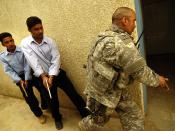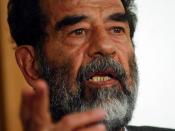Ethical issues in times of war is a near impossible subject, there are so many variables, so many grey areas and unknown details. The war in Iraq both in the Gulf War (January-February 1991) and the Iraq war (March 2003 - June 2004) both had significant ethical issues on both the sides of the Iraqi people and those who invaded them. Racism and discrimination during wartime towards the Kurdish people of North Western Iraq by the Iraqi government was a critical ethical issue of the Gulf War. The justification offered to the United Nations and their respective countries was a major ethical issue for the "Coalition of the Willing" lead by America and including United Kingdom, Spain, Japan and Australia. Both have had profound impact on the governments of both participating countries and their people.
Slightly before the Gulf War, there was a occurrence of racism and discrimination brought upon the Kurdish people of North Western Iraq.
On March 16th, 1988 the Kurds suffered the worst chemical attacks committed by the Iraqi regime. On that day in Halabja, 5,000 innocent civilians, 75% women and children, immediately perished. This was not the only chemical weapons attack it was just the worst. Called the Anfal, the atrocity was a three day attack consisting of convention weapons and chemical weapons like Mustard Gas and the nerve agents Sarin, Tabun, and VX. Almost 20,000 were killed over the three day attack. This information was verified by the Human Rights Watch that stated:
"The (Anfal) campaign was characterized by gross violations of human rights, including mass summary executions and disappearances of many tens of thousands of non-combatants; the widespread use of chemical weapons, among them mustard gas and nerve agents that killed thousands..."
The Iraqi Government lead by dictator Sadaam Hussein, purposely sought the...


